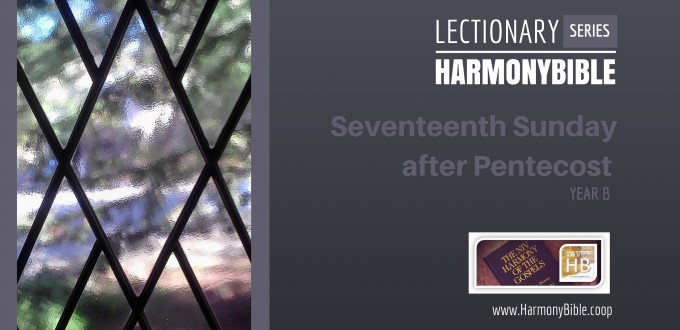September 20, 2015
Seventeenth Sunday after Pentecost, Year B
 Our reading this Sunday from Mark 9:30-37 spans three sections in the Harmony of the Gospels (Sections 88-90).1 When reading from the Harmony of the Gospels we discover that in the midst of today’s reading was another important dialog (section 89).2 In between last Sunday’s reading and today the chronology of the Gospels reveals that Jesus had begun explaining plainly to the disciples that as the Son of Man he must go to Jerusalem and suffer even more at the hands of the religious leaders (section 83). He reminded them then to count the cost of being associated with him (section 84). A week or so later he underwent the transfiguration (Section 85) and a dialog with the disciples about Elijah as they descended from the mountain (section 86). What comes just prior to today’s reading is the deliverance of yet another demoniac, and immediately after today’s reading Jesus and his disciples journey to Jerusalem for the Feast of Tabernacles after which he commissioned the seventy for ministry.3
Our reading this Sunday from Mark 9:30-37 spans three sections in the Harmony of the Gospels (Sections 88-90).1 When reading from the Harmony of the Gospels we discover that in the midst of today’s reading was another important dialog (section 89).2 In between last Sunday’s reading and today the chronology of the Gospels reveals that Jesus had begun explaining plainly to the disciples that as the Son of Man he must go to Jerusalem and suffer even more at the hands of the religious leaders (section 83). He reminded them then to count the cost of being associated with him (section 84). A week or so later he underwent the transfiguration (Section 85) and a dialog with the disciples about Elijah as they descended from the mountain (section 86). What comes just prior to today’s reading is the deliverance of yet another demoniac, and immediately after today’s reading Jesus and his disciples journey to Jerusalem for the Feast of Tabernacles after which he commissioned the seventy for ministry.3
Section 88 | Second Prediction of Jesus’ Death and Resurrection
[one_third last=”no”]Matthew 17:22-23
22 While they were staying in Galilee, Jesus said to them, “The Son of Man is about to be delivered up into the hands of men, 23 and they will kill him, and the third day he will be raised up.” They were exceedingly sorry.[/one_third]
[one_third last=”no”]Mark 9:30-37
30 They went out from there,4 and passed through Galilee. He didn’t want anyone to know it. 31 For he was teaching his disciples,5 and said to them, “The Son of Man6 is being handed over to the hands of men, and they will kill him; and when he is killed, on the third day he will rise again.”7 32 But they didn’t understand the saying,8 and were afraid to ask him.9[/one_third]
[one_third last=”yes”]Luke 9:43b-48
43b But while all were marveling at all the things which Jesus did, he said to his disciples, 44 “Let these words sink into your ears, for the Son of Man will be delivered up into the hands of men.”
45 But they didn’t understand this saying. It was concealed from them, that they should not perceive it, and they were afraid to ask him about this saying. [/one_third]
Section 89 | Payment of Temple Tax
Matthew 17:24-27
24 When they had come to Capernaum, those who collected the didrachma coins came to Peter, and said, “Doesn’t your teacher pay the didrachma?” 25 He said, “Yes.” When he came into the house, Jesus anticipated him, saying, “What do you think, Simon? From whom do the kings of the earth receive toll or tribute? From their children, or from strangers?” 26 Peter said to him, “From strangers.” Jesus said to him, “Therefore the children are exempt. 27 But, lest we cause them to stumble, go to the sea, cast a hook, and take up the first fish that comes up. When you have opened its mouth, you will find a stater coin. Take that, and give it to them for me and you.”
Section 90 | Rivalry over who is the Greatest in the Kingdom
[one_third last=”no”]Matthew 18:1-5
1 In that hour the disciples came to Jesus, saying, “Who then is greatest in the Kingdom of Heaven?”
2 Jesus called a little child to himself, and set him in the middle of them, 3 and said, “Most certainly I tell you, unless you turn, and become as little children, you will in no way enter into the Kingdom of Heaven. 4 Whoever therefore humbles himself as this little child is the greatest in the Kingdom of Heaven. 5 Whoever receives one such little child in my name receives me,[/one_third]
[one_third last=”no”]Mark 9:33-37
33 He came10 to Capernaum,11 and when he was in the house12 he asked them, “What were you arguing among yourselves on the way?”13 34 But they were silent,14 for they had disputed with one another on the way about who was the greatest. 35 He sat down, and called the twelve; and he said to them,15 “If any man wants to be first, he shall be last of all, and servant of all.”16 36 He took a little child, and set him in the middle of them.17 Taking him in his arms, he said to them,
37 “Whoever receives one such little child in my name,18 receives me, and whoever receives me, doesn’t receive me, but him who sent me.”[/one_third]
[one_third last=”yes”]Luke 9:46-48
46 An argument arose among them about which of them was the greatest.
47 Jesus, perceiving the reasoning of their hearts, took a little child, and set him by his side,
48 and said to them, “Whoever receives this little child in my name receives me. Whoever receives me receives him who sent me. For whoever is least among you all, this one will be great.”[/one_third]
With this passage about the Lord’s identity and purpose and our calling to the ministry of reconciliation we can now better prepare ourselves to hear an head the significant wisdom within today’s Epistle reading (James 3:13-4:3, 7-8a), the Old testament reading (Jeremiah 11:18-20), and Psalm (Ps 54).
Now the fruit of righteousness is sown in peace by those who make peace. Be subject therefore to God. But resist the devil, and he will flee from you. Draw near to God, and he will draw near to you. – James 3:18, 4:7-8a WEB
- Last week our Gospel reading was from Section 82, where Jesus was at Caesarea Philippi in the region of Ituraea
- See week 83 in our regular series.
- The twelve apostles we appointed in Section 70b.
- Having come down from the Mount of Transfiguration which was most certainly a mountain above Caesarea Philippi in Ituraea, perhaps Mt Hermon (see map) into the region of Galilee on his way to Capernaum. The 30-40 mile hike would have taken about 12-15 hours, most likely 2-3 days.
- There were many important lessons to instill in the disciples so that they would be effective and further the mission of Christ (2Cor 5:11-20)
- The first time we hear this term in the Gospels is in Section 28, when Jesus called the first followers. In Daniel 7 we see the first use of the term as a prophetic description of the one who will save humanity. Its a Messianic term which acknowledges his human nature but emphasizes his exalted and eternal Divine nature. It was Jesus’ favorite self-designation perhaps because it was ever so subtle – for those who had ears to hear. Yet later, when he was on trial the high priest asked him, “Are you the Christ, the Son of the living God?” and he replied, “I am, and you will see the Son of Man coming with great power and glory.” (Section 155 | Mt 26:63-64; Mk 14:61-62). With this account we see even on the eve of his death that Jesus professed his Divine Messianic nature and purpose which repulsed enough of the religious leaders that he was crucified thus fulfilling the prophecies to an even greater degree.
- Here’s a direct prophetic statement of what will come about within a years time.
- Since Matthew writes that they were saddened by the lesson (Mt 17:23), it is reasonable to interpret this to mean that it didn’t make sense to them why it had to be that the Messiah should have to die. In truth, even today many people, and even Christians fail to understand the importance of his death, propitiation, and the nature of God’s grace that has been mercifully bestowed to us.
- How many sitting in the pew this day would like to ask this question but haven’t? How many would like an answer to this question? How many would like to experience the freedom and spiritual fortitude that comes with the understanding of such truth.
- The Latin Vulgate and the Syriac versions, use the plural, “they came” – Christ and his twelve disciples. This is understood by reading vs 33 and Jesus’ use of “them” “along the way”.
- A 2-3 day journey from the region of Ituraea in the mountains above Caesarea Philippi.
- Probably the home of Simon and Andrew.
- Surely the one who knew the thoughts of others knew what they had been talking about. He asked so that they might come to repent on their own.
- Jesus’ gracious inquiry and love had already begun to transform their hearts.
- Now that their hearts were softened to hear the truth and take on the character of Christ, he began teaching them. Had they still been obstinate, he most likely would have spoken as sternly to them as he did to Peter one week earlier when he said, “get behind me Satan” (Section 83 | Mt 16:23; Mk 8:33)
- Such avarice and vanity are sinful, debased manifestations of the disciples (and our own) purpose and stewardship of the gifts and vocation given us. Learn more about our “emotivational needs” in the Emotivational Theory.
- Could this a child of the Apostle Peter? There is nothing certain from scripture and only Eusebius mentions his having children. And in the intervening passage in today’s study (Section 89) Jesus asks Peter from whom do kings exact taxes, tolls and tributes – from children or strangers (adults). So twice in this setting we hear reference of a child (or children) in the home. Could it have been a neighbor or extended family? Perhaps, but it seems likely that Jesus’ question about the taxes placed a child in the household of Peter.
- as one of my own
